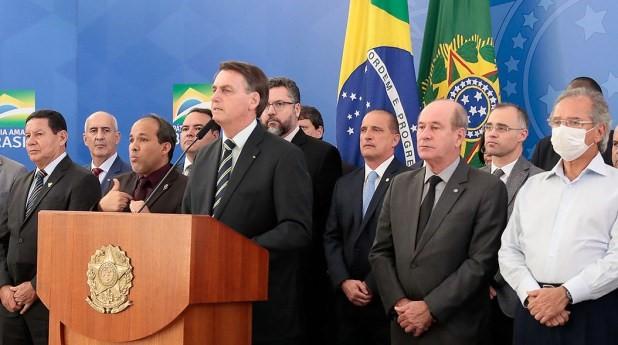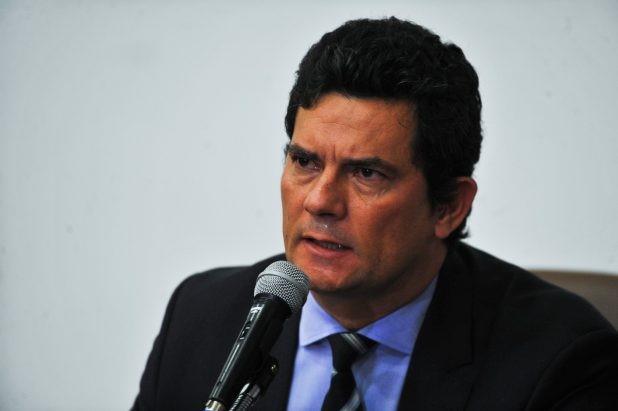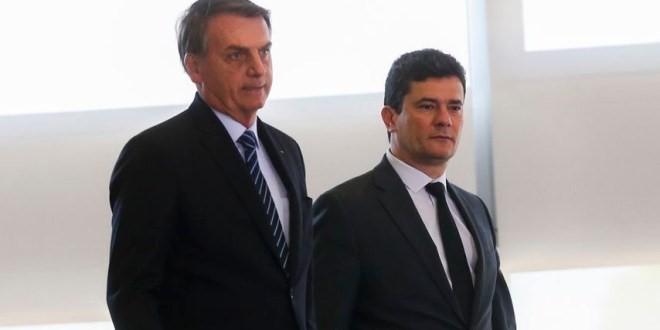Bolsonaro's goverment in Brazil is wracked with splits and crises. The ruling class is hopelessly divided over the coronavirus pandemic and the economic calamity facing the country.
Read the original in Portuguese |
On Sunday 19 April, Bolsonaro took part in a public protest to call for military intervention, closing of Congress, ending social isolation and reopening of companies and commerce. This provoked outrage among the ministers of the Supreme Court (STF), congress representatives and senators – including the president of the House of Representatives, Rodrigo Maia (DEM) – business sectors, the media, and even among other layers of the bourgeoisie.
Bolsonaro did not only attend the public protest, but he also made speeches and said he did not want to “negotiate anything” with Congress and, using his traditional demagoguery, said that “now the people have power”. The episode helped to further deepen the isolation of the government from the masses and layers of the bourgeoisie itself.
 Bolsonaro following the dismissal of Moro / Image: Carolina Antunes PR
Bolsonaro following the dismissal of Moro / Image: Carolina Antunes PR
In the following days, tensions intensified significantly. When asked by journalists about his participation, Bolsonaro attacked the press, said he never said anything against democracy and concluded by paraphrasing Luís XIV, declaring: “As a matter of fact, I am the constitution”.
However, as Marx said, “all great world-historic facts and personages appear, so to speak, twice... the first time as tragedy, the second time as farce.” By declaring “L'État c'est moi” (“The State is me”), the Sun King was speaking of the power of the French absolutist monarchy, and the strength of the modern state that was born under his rule. In the case of Bolsonaro, it is a cry of despair of a failed candidate to become a “new Bonaparte” – one who needs to compete with other institutions (and even his own ministers) to govern.
There are two central elements that contribute to the increase in tensions. First, the disagreement over how to deal with the COVID-19 pandemic and its social and economic consequences; and secondly how to meet the resulting economic crisis that has already made an impact and will damage Brazil even further.
The pressure is causing the Executive to clash directly with the other state powers. It's an arm-wrestling competition to see who's in charge of the country. This dispute existed before, for example, in the question of the release of “parliamentary amendments": the money to carry out work that had already been approved by Congress, and whether it would remain under the responsibility of the Executive or be controlled by the Congress itself. Besides, there are several disputes with the judiciary over different processes involving members of Bolsonaro’s former party, the PSL, precisely from the wing that broke with Bolsonaro and his children over corruption and involvement with the militia. Now things in government are going from bad to worse.
Bolsonaro strongly criticises social isolation measures, even though they are far from being as strict as those in other countries, such as China, Italy and Germany. With this rhetoric, he seeks to distance himself from the economic consequences of the crisis and, at the same time, keep an open dialogue with a base of small and medium-sized entrepreneurs and the retail sector, etc. who are failing because of the quarantine organised by the states.
In early April, Bolsonaro had already suffered a defeat when the Supreme Court banned the government from adopting measures to fight decisions taken by governors and mayors, who had been organising social isolation, and the closure of schools and commerce, in the fight against the spread of coronavirus.
In the National Congress, Bolsonaro's last defeat was the approval of aid of R$90 billion to help states and municipalities. The aid was prepared by the House of Representatives, against the president's wishes, in the form of a reimbursement to states and municipalities of taxes that will no longer be charged due to the quarantine and social isolation measures. It's important to bear in mind, however, that despite some conflicts, the Congress supports the government's economic measures of attacks on workers, as well as the Central Bank’s decisions to make “deals” involving bad securities on the financial market. This amendment to the constitution also gave permission to grant unlimited credit under the direct control of Bolsonaro to “fight the epidemic”. The problem is that Bolsonaro wants much more than that.
Contrary to what is established in the constitution, the Supreme Court validated the provisional measure that allows the reduction of wages by cutting down working hours, and the cancellation of employment contracts, with extremely low unemployment benefit. Three million workers with formal contracts have already been affected by this measure, out of a total of 33 million with signed contracts. That is, approximately 10 percent of the total number of workers. The number of those who have lost their jobs has not yet been released, but it will be even higher. Not surprisingly, the bourgeoisie is pushing for this measure to continue “after the crisis.”
Paladins of democracy
The bourgeoisie understood Bolsonaro's message and has been railing against the president since Sunday. In its April 23 editorial, the State of S. Paulo explained its point of view:
“Democracy is threatened when a president uses the visibility and institutional importance of his station to charge against other powers, as Bolsonaro does; it is threatened when virtual militants, some seated in the Planalto Palace, confuse public opinion with the most diverse lies to demoralise the opposition; and is threatened when the president systematically criminalises politics, suggesting that the 'will of the people' is exclusively represented by him and must be met without any discussion.” (Bolsonaro and democracy, 23/4)
Other newspapers, also concerned about the “will of the people” cited in the president's speech, devoted their comments to the explanation that the National Congress already represents this will. This reasoning, shared by virtually the entire traditional press, expresses a central idea: it is necessary to preserve “democracy", that is, bourgeois institutions.
Impeachment
Bolsonaro's impeachment again dominated the newspapers, along with the unanimous concern of commentators regarding who would take over in his place. Everyone has doubts about what a new government would look like and cannot see a substitute capable of controlling the situation. But the bourgeoisie does not rule out this possibility and it can be used if it is the only way out to save the system.
In this task, the ruling class has important allies. The main one is Luiz Inácio Lula da Silva. Lula, who until yesterday argued that it was not time for the slogan “Fora Bolsonaro", is now not only proposing to take up this demand, but will join ex-President Fernando Henrique Cardoso “on the podium” during 1 May to speak against Bolsonaro – and in defence of democracy, of course. The changed position of the PT is important, as it seeks to limit the room for an independent movement of workers and young people, creating a barrier against the revolutionary explosion that everyone is predicting. Lula's message is direct:
“We need to start saying 'Fora Bolsonaro' because we can not allow him to destroy democracy. The institutions should have reacted by now.” (Folha de S. Paulo, 23/4)
Lula and the Workers' Party (PT) have taken up “Fora Bolsonaro” out of pure opportunism, because they seek to save the institutions – just as the bourgeoisie wants – but by another, supposedly more radical method. The real goal of this working-class traitor is to use his authority to channel popular dissatisfaction against Bolsonaro and save the bourgeois state. The manoeuvre aims to build a “democratic front", which – acting within the current institutions – seeks the removal of the president by parliamentary means ("impeachment"), undercutting the need for revolutionary struggle.
The current leaders of the working class are increasingly moving to the right and this is the only path they will follow, however “revolutionary” they seem.
The ‘good’ bourgeois and the working class
In the midst of these crises, the discourse that it is time to think about the country, the pandemic, etc. is exploited by bourgeois elements, who are supposedly concerned with the population. We must understand that this more “rational” bourgeoisie seeks only to save itself and, therefore, is not immune to the pressures of the market.
Governors such as João Doria (PSDB), from São Paulo attempted to implement social isolation in order to mitigate the impact of the pandemic. He knows that his reputation and political career are at stake. He also knows that if he can contain social unrest and minimise deaths, many will nevertheless still die, but fixed capital – machines and equipment – will remain, meaning production can soon resume regardless. Doria has announced a “good cop, bad cop” proposal for the resumption of trade and small business activities and, at the same time, says that it might be necessary to delay this decision if the number of deaths increases.
By contrast, Santa Catarina, Governor Carlos Moisés (PSL) allowed the opening of shopping malls and other commercial activities that will result in big gatherings, and create an environment that will help spread the virus. The governor of the Federal District imported test kits for the virus and is now starting to rehearse a resumption of production. In Rio de Janeiro, after announcing a partial resumption, the governor was forced to back down, due to the number of deaths announced.
The first motivation for all of them is saving capitalism. They rely on the PT’s manoeuvring and the passivity of the union leaderships, which have signed and validated the agreements for salary reductions. Bosses who are able to stop production now will at some point feel the impact of the collapse of the world economy and will need to resume production again to survive. With or without pandemic, they will try to resume their activities.
The biggest concern for this layer of the ruling class is the political impact of this pandemic. No sensible bourgeois is willing to face the widespread fury of those who are losing their jobs, losing family and friends, or risking their lives to maintain the profits of bosses, as we explained earlier:
“Given these conditions – the ‘flu’ of the Trumps and Bolsonaros, to name but two political manifestations of bourgeois decay – is imposing considerations of such an order that it is no longer just about admitting and accounting for a temporary drop in profits, but rather avoiding immediately and at any cost a disastrous social rupture, on a national and international scale. And in addition to the deaths that could have been avoided, in addition to the suffering from unemployment that is already skyrocketing, in the medium and long term, the bill will still be presented to workers.” (The pandemic and capitalism, Ruy Penna)
Images such as the mass graves dug hastily in Manaus, Amazonas impact deeply on the consciousness of the masses. These images recall the scenes of army trucks, carrying the dead by coronavirus in Italy; or images of bodies dumped on the streets of Ecuador, because the number of victims by the disease is greater than can be endured not only by the health system, but also the funeral homes.
All this suffering will be blamed on capitalism, and the bosses know it.
Moro leaves the government
On Tuesday 21 April, the Judiciary began a new attack when the Minister of the Supreme Court, Alexandre de Moraes decided to meet the request of the Attorney General of the Republic, Augusto Aras, by opening an inquiry to investigate “facts pertaining to criminal acts” involving the organisation of Sunday's events. It is known from the beginning of the investigations of the Parliamentary Committee of Inquiry (CPI) into Fake News that Bolsonaro's children are directly linked with the creation and promotion of pro-Bolsonaro pages that attack the Judiciary and Congress, and call for pro-government demonstrations.
 Sérgio Moro announcing his resignation during a press conference / Image: Marcello Casal Jr., Agência Brasil
Sérgio Moro announcing his resignation during a press conference / Image: Marcello Casal Jr., Agência Brasil
Two days later, the Minister of the Supreme Court, Celso de Mello, set a deadline of 10 days for Rodrigo Maia to submit information about an impeachment request against Bolsonaro.
On the same day, 23 April, Bolsonaro decided to dismiss the Director General of the Federal Police (PF), Maurício Valeixo: the most trusted lieutenant of the Minister of Justice, Sérgio Moro. The resignation was realised on 24 April, and a few hours later, Moro, the minister who gave some legitimacy to the government, resigned. The political consequences could be disastrous for the Bolsonaro government.
The former Minister of Justice praised the autonomy that the previous governments gave to the PF; that is, the Lula and Dilma governments. The great national alliance in defence of the Democratic State of Law (which means the bourgeois state) is emerging between the PT, the PSDB and even Moro.
The global crisis of capitalism catalysed by the coronavirus pandemic is shaking the whole world. There is no country that will emerge unscathed from this situation. While the bourgeoisie is divided in its attempts to save its regime, the working class suffers from rising unemployment, poverty, deaths by COVID-19, etc.
The task of Marxists, in this period when the leaders of the left seek to sow confusion and prevent the masses from organising themselves independently of the bourgeoisie, is precisely to help the masses organise themselves. For this, we must commit ourselves to the construction of the Fora Bolsonaro action committees, organise online meetings and win over the maximum number of radicalised workers and youth to participate in the activities of the Marxist Left. We are talking about a period of revolution and counterrevolution, in which the only way out is socialist revolution. Our task is to prepare the leadership that will, together with the working class, bring an end to capitalism.

